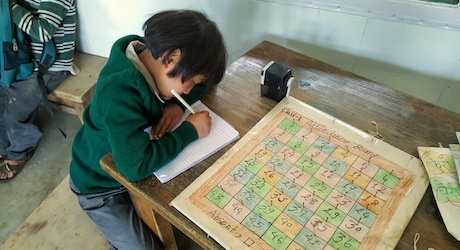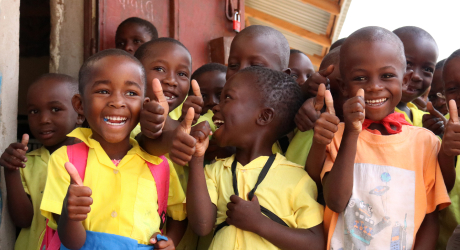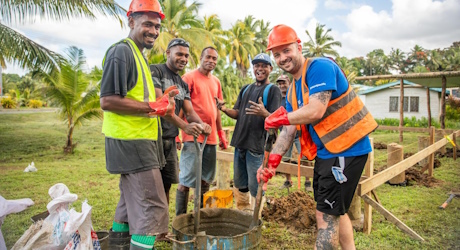Footprints Project
Since 2005, travelers like you have helped us change the world through micro-donations.

-
A total of
5960
Travelers
-
donated
$20002.49
(100% funded) -
to help improve
Education
-
impacting
3116
people -
in
Nepal
Project Background
The Australian Himalayan Foundation works in partnership with the people of the Himalaya to help the most disadvantaged meet their priority needs through integrated improvements in education, health and the environment.
Established in 2005, AHF’s flagship Teacher Training and Quality Inclusive Education (TTQIE) project is helping to ensure that children living in one of the poorest regions of Nepal have access to inclusive, high-quality education. AHF works with its partner REED Nepal to improve opportunities through education.
The project includes a range of activities including: teacher training; literacy programs; parent volunteer opportunities; support to child-led clubs; and providing materials for classroom and school upgrades.
Without access to quality education, children in remote communities like the Everest region of Nepal are deprived of essential life skills and knowledge gained from education. For these children, even to complete primary school is a significant achievement. Every year of schooling has a tangible and measurable academic outcome, influences future earnings, and offers protection from child labor, early marriage and human trafficking. A key part of our work is focused on addressing gender equality, disability inclusion and child safeguarding.
Project overview
TTQIE focuses on developing schools in the Solukhumbu district of Nepal to become centres of excellence (Namuna schools) with quality teachers and educational resources which provide safe and supportive learning environments.
The project goal is to achieve inclusive and quality education for all children in TTQIE schools in Solukhumbu, including during emergencies, along with key activities that will support:
- increased teacher capacity
- strengthened governance and service delivery across 7 rural municipalities and 100 TTQIE schools
- increased parent engagement across 100 schools for a supportive learning environment at home
- child friendly, safe and inclusive learning environment implemented at schools
- inclusive education for girls and Children with Disabilities (CwD) achieved in TTQIE schools, and
- continuity of children's education during emergencies.
The target indicators for the project include 100% of TTQIE schools average learning achievements exceeding the national averages for grades 1-3 in numeracy and literature; grade 3 reading proficiency and grades 4-8 STEM subjects, by the end of the project. In addition:
- All TTQIE schools achieve at least 90% average student attendance rate by the end of the project period
- At least 90% of students who have completed basic education (grade 8) retained till grade 10 in all 31 TTQIE secondary schools
- 100% TTQIE schools achieved at least 90% rate of students graduating (not repeating) and moving to next grade
- Increased enrollment, attendance and retention (year to year) rate of disadvantaged students (girls, CwD) in each of 100 schools
- Students from 100 TTQIE schools in 7 rural municipalities have accessed continued education through alternative modes during emergencies
The new education project will pay particular attention to promoting gender equality and equity, as well as improving child safeguarding, and preventing gender-based violence (GBV) and youth suicide
2020-2021 key achievements
The delivery of the TTQE program was impacted through COVID-19 but in 2020/2021, your donation, in conjunction with funding from private donors and the Australian government helped achieve the following significant outcomes:
- 1,750 children (895 female) in 11 Namuna Schools accessing improved educational facilities, learning support and classroom resources
- 736 children (349 female) in 14 schools receiving early grade literacy materials and support
- 286 parent volunteers (195 female) engaged in supporting their children’s reading groups at school
- 189 teachers from across 100 schools trained in English, Maths, Science or Early Childhood Education
- 1,051 people accessed hygiene and COVID-19
- 80 radios distributed to the most vulnerable children to ensure access to radio lessons so both children could continue their education, and whole families could hear COVID safety messages
- 5,655 children (2903 girls and 2752 boys) from grade ECED to grade three received workbooks and learning materials to support distance learning
- 63 local teachers (43 female and 20 male, including one Person with disability) were mobilised at 63 EMS schools and 969 children including 9 children with disabilities received support from these teachers to continue their education
- 15 additional children who became extremely vulnerable due to the COVID-19 crisis were identified and supported
- REED distributed soap, hand sanitisers, masks to 100 EMS schools. These protective materials have supported children 14,089 (7,184 girls and 6,905 boys)
- 168 children (81 Boys and 87 Girls) at four schools continued the school food program providing nutritious meals after schools were reopened, assisting with school attendance and retention
- In the April 2020-March 2021 school year, 339 students (217 girls) were supported with Going to School Support
How did the project fit into a larger strategy?
All activities undertaken worked towards four key objectives:
- Develop Namuna Schools that can serve as models to other schools across the district
- Improve children’s competency in Nepali literacy in early years
- Improve teacher skills and learning outcomes in the three main foundational subjects of English, Maths and Science
- Provide scholarships and other support to very disadvantaged and marginalised children (Going to School Support, GSS).
Traveling soon? When you buy travel insurance with us, you can make a contribution towards a cause you care about.
Get a quote






